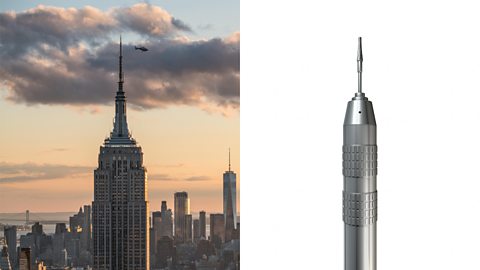Stanza One

This morning I watched from here
MacCaig opens the poem at a specific time, just as the title puts us in a specific place. Together with the use of real landmarks, this makes the poem feel like a genuine, real experience. This creates a sense of immediacy that is consolidated later in the opening stanza with But now
. With these two quotes, he suggests that the themes of the poem need to be discussed and are relevant to the time of writing.
A helicopter skirting like a damaged insect/ the Empire State Building
In the second line, MacCaig introduces images of modern technology but immediately criticises them.
A simileA comparison using 'like' or 'as' to create a vivid image. For example, as big as a whale, float like a butterfly, sting like a bee. compares the helicopter to an insect, suggesting that it is insignificant - it appears small among the buildings. Insect also suggest something that buzzes around and is annoying. Not only is it annoying, but it seems damaged
. This modern invention is like an inferior copy of nature. A helicopter may commonly be associated with wealth, and MacCaig may be making a subtle social comment here: perhaps it is society that is тАШdamagedтАЩ by the ever-increasing pursuit of technological and material wealth. With this comparison, MacCaig poses questions about the worth of certain technological achievements.
A metaphorAn imaginative way of describing something by associating it with something else. A metaphor differs from a тАШsimileтАЩ as it is not a straight comparison (with the use of the words тАШlikeтАЩ or тАШasтАЩ). A good metaphor creates a vivid picture тАУ for example, тАШmy life is a roller coasterтАЩ. states that the Empire State Building (the cityтАЩs tallest landmark at the time) is a jumbo sized dentistтАЩs drill
. This is a humorous image тАУ what use would a dentist have with a drill of this size? MacCaig suggests that a building of this size is pointless. He seems to criticise an (American) view that тАШbigger is betterтАЩ. On a more aesthetic level, MacCaig is clearly showing his disdain towards the appearance of the building.
The dentist drill has connotationAn idea or image which is suggested by a word, which is not its dictionary meaning, eg the connotation of 'desk' might be school. of pain and suffering. Again, he may be making a deeper point regarding the inequality of society and the suffering of groups of people who are left behind by progress. It can also be read as a tool, or weapon, that is used in the fight against decay. This is a bright, modern image that is soon surrounded by darkness.
But now midnight has come in/from foreign places
Towards the end of Stanza One, the focus shifts to night-time New York. But
acts as an obvious turning point around which the time shifts from morning to the middle of the night. The mood of the poem changes to something more solemn.
While midnight
literally refers to a time, it also metaphorically introduces the idea of the darkness and the unknown and, consequently, fear. This idea of fear and conflict is re-enforced with foreign places
and uncivilised darkness
later in the stanza. This could suggest that modern America is in conflict with anything that is тАЬforeignтАЭ or that doesnтАЩt tie in with its view of what is civilised.
Conflict is extended when MacCaig writes that the darkness
is being shot at
by a million lit windows
. This brings to mind the USAтАЩs close association with guns, such as the place of guns in taming the Wild West. The image suggests the buildings of the city in battle with the surrounding darkness. Here, darkness, with its associations of evil and the unknown, is in battle with artificial light, alongside its connotations of life, knowledge and progress. This raises questions about humanityтАЩs ability to use its own inventions (electric light in man-made buildings), combat the inevitable return of night and darkness, and possibly humankindтАЩs most instinctive, perhaps destructive, desires.
all/ ups and acrosses
MacCaig ends the stanza suggesting that shots are being fired upwards, just as the skyscrapers point up to the sky. However in Stanza Two he goes on to suggest that violence is occurring elsewhere, down in the streets below. Acrosses
, with its inclusion of the word тАЬcrossтАЭ carries a religious connotation. The image suggests the Western Christian image of good fighting evil and darkness.